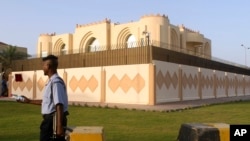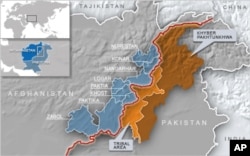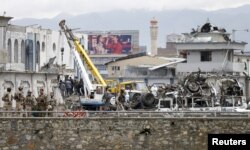Afghanistan’s Taliban has confirmed it has sent a “high-level’ delegation to Islamabad for talks with Pakistani officials, saying it hopes the visit will have “fruitful results” and “in the interest of both countries.”
A spokesman for the Islamist insurgency told VOA on Wednesday the Taliban delegation has traveled from its “Political Office” in Qatar to hold the discussions in the light of “close relations, long border and commercial transactions” between the two neighboring countries.
Pakistani officials have not yet commented on the presence and purpose of the Taliban’s visit.
Diplomatic sources have confirmed to VOA the Taliban delegation is on a mission for “exploratory discussions” with Pakistani interlocutors as part of Islamabad’s efforts to facilitate peace talks between the Afghan government and the Taliban.
Peace in Afghanistan
The Taliban's political office in the Qatari capital of Doha is solely authorized to conduct political talks.
“The esteemed leader of Islamic Emirate [the Taliban] has instructed the delegation to discuss issues regarding Afghan refugees, some recent problems related to [Afghan] border provinces of Helmand, Nangarhar and Paktia,” Taliban’s Qatar-based spokesman Mohammad Naeem told VOA, without elaborating.
Afghan media reports have recently alleged that Pakistani border forces tried to establish outposts inside the Afghan territory in Helmand, Nangarhar and Paktia, charges Islamabad denies.
Naeem said Taliban negotiators will particularly discuss with Pakistani authorities the release of Mullah Bradar and some other prisoners.
“The delegation, which is gone (to Pakistan) from here (Qatar) is holding talks on the issues that I have stated above and has no other particular item on the agenda,” Naeem told VOA when asked whether reconciliation talks with the Afghan government would also be discussed.
A deputy leader of Afghanistan’s High Peace Council, Mawlavi Abdul Khabeer, says Kabul is neither aware nor has it anything to do with the insurgency’s delegation visiting Pakistan. The council is tasked to promote peace and reconciliation with anti-government armed opposition.
“This is an attempt by Pakistan to ease international pressure it has come under after the Kabul attack,” Khabeer told VOA, referring to April 19 Taliban bomb-and-gun attack in the Afghan capital that killed nearly 70 people and wounded about 350 others.
Prisoner release
Mullah Bradar, former deputy chief of the Taliban leader, was detained by Pakistani intelligence officials in the southern city of Karachi in 2010 reportedly in a joint operation with American counterparts.
In 2013, Pakistan, at the request of the then Afghan government, freed Bradar along with dozens of other Taliban officials from its custody to boost Kabul’s efforts to promote the Afghan peace and reconciliation process at the time.
But insurgent sources insisted Bradar remains in Pakistan and local authorities have placed restrictions on his movement because Pakistani authorities would need U.S. consent to set him free.
Ghani asks for Pakistani help in the peace process
The deadly Kabul assault outraged Afghans, dealing a blow to efforts a four-state group of Afghanistan, Pakistan, the United States and China has been making to organize Afghan peace.
President Ashraf Ghani on Monday urged Islamabad to honor its commitments of helping in the Afghan peace process or evict Taliban leaders using sanctuaries in Pakistan for directing attacks in across the Afghan border.
But a Pakistani foreign ministry spokesman rejected Ghani’s allegations Islamabad is supporting insurgent attacks in Afghanistan and reiterated Pakistan was making “sincere efforts” to gather with other members of the four-way group to promote peace talks between Kabul and the Taliban.






